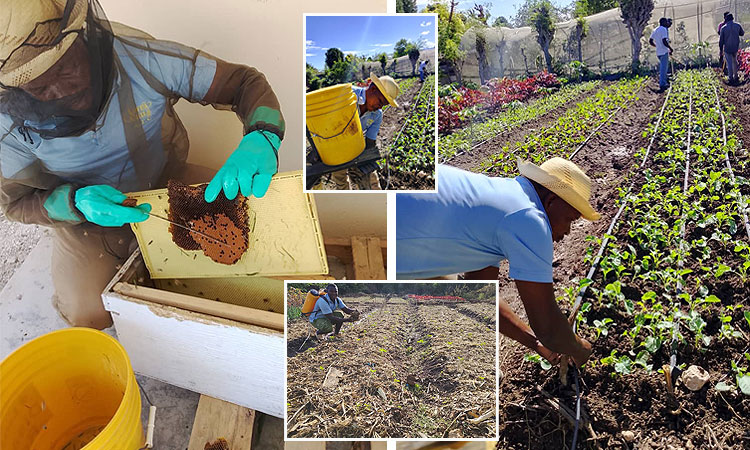Wilner focuses our ATC courses on “Agro-ecology,” teaching the relationship between people’s actions and the environment. Today we look at three of our most important themes for demonstrating good Agro-ecology: appropriate irrigation, using heavy mulches, and relying on bees.
Drip irrigation is very appropriate in arid areas that need a lot of irrigation support, like Haiti. Drip irrigation is much more effective and efficient at giving plants the amount of water they need where they need it – at the root zone – rather than using traditional row flooding, aerial spraying, or other methods that use a lot of water that mostly ends up parching the ground and evaporating before it gets to the root zone. When irrigation water is scarce, as in Haiti, you must use the most appropriate way to get moisture to the plant roots instead of running off or evaporating before it has time to benefit the plants.
Using thick, heavy organic mulch conserves the scarce ground moisture. This protects the soil from erosion from both winds and heavy rains that don’t have time to soak deep into the ground where the roots are. This also helps keep the soil around the plants cooler and prevents the top layer of the soil from getting sunbaked, shedding any scarce rain, rather than allowing it to slowly seep deep into the ground. As the soil microbes work on the organic material of the mulch, it breaks down into many micronutrients, becoming a fine organic fertilizer. After using heavy mulches for even a short time, the soil underneath is much more alive, viable, and fertile, supporting healthy and abundant plant growth while its shade conserves the ground moisture hosting many beneficial soil microbes. When you pull back the mulch you can see and smell what fresh, high-quality soil is like. Mulch alone will convert even spent, barren, life-less soil back into thriving, fertile soil alive with microbes and nutrients.
Once you have thriving plants – then you need to make sure their flowers get pollinated for the “fruit” (or vegetables) to set. We promote using bees for increasing pollination, ensuring an abundant crop will be available for harvest. Keeping bees doesn’t require a lot of work and a sweet side benefit is getting that “siwo-miel,” or honey.
Rad Hazelip, Love A Child’s Assistant Executive Director


